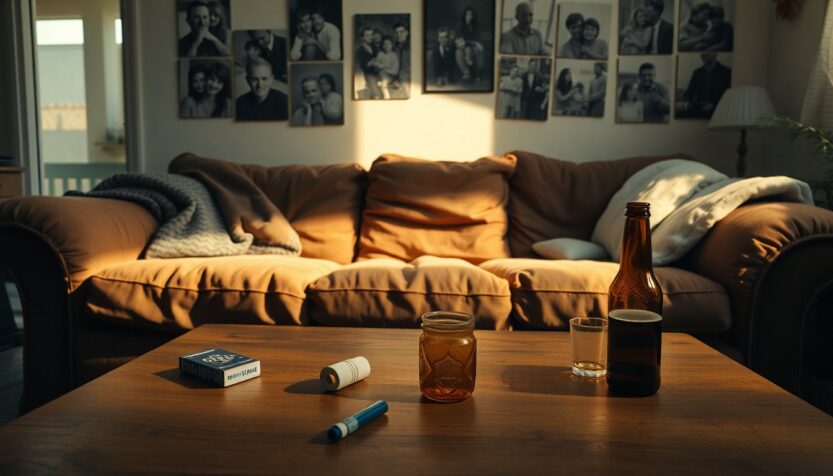In the realm of cinema, art reflects reality, particularly regarding the evolving archetypes of male characters. A fascinating shift is observable in the portrayal of masculinity on screen. From the carefree Gen Z figures, typified by individuals like Pete Davidson, to the charming yet superficial ‘himbo’ characters in films like Barbie and Saltburn, portrayed by actors such as Ryan Gosling, a new character type has emerged: the sad stoner dad.
As 2025 draws to a close, this archetype is gaining traction, characterized by a blend of vulnerability and detachment. These characters often appear out of sync with their surroundings, grappling with a sense of paranoia while possessing a deeper awareness of their inner lives compared to the average man.
Characters embodying the sad stoner dad
One notable example is Leonardo DiCaprio’s portrayal of Bob in Paul Thomas Anderson’s One Battle After Another. Bob is a retired political activist who finds solace in cannabis, contrasting sharply with the suave and reckless characters DiCaprio has portrayed in the past. Bob’s character shares a spiritual lineage with Jeff Bridges’s iconic Dude from the 1998 classic The Big Lebowski. In a poignant scene, Bob prepares for a parent-teacher conference with his daughter Willa by engaging in frantic vaping, only to be moved to tears upon learning of her academic achievements. This juxtaposition reveals not only his affection for Willa but also his recognition of his shortcomings as a father.
Exploring deeper connections
Bob’s struggle is intensified by a past filled with unresolved issues, particularly concerning his ex-partner, Perfidia, who abandoned him and Willa sixteen years prior. As described by Anderson, Bob is “growing older and increasingly irritable,” grappling with the mundane challenges of daily life. He seeks to connect with Willa but feels lost in a world that seems foreign to him. DiCaprio emphasizes that Bob’s journey centers on rediscovering his purpose in a rapidly changing society, highlighting the necessity for men to confront their fears and step out of their comfort zones.
The theme of midlife reflection is echoed in Bradley Cooper’s character, Balls, from the upcoming film Is This Thing On?, where he navigates the complexities of fatherhood and personal growth. Alongside Will Arnett’s character Alex, both men bond over their cannabis use as they confront the realities of middle age. Cooper describes the film as more of a midlife catharsis than a crisis, revealing how these characters experience epiphanies regarding their relationships and aspirations.
The changing landscape of fatherhood
The narrative continues in the series Nobody Wants This, where characters Sasha and Esther engage in candid discussions about their marriage after consuming edibles. Set against the iconic backdrop of the Hollywood sign, they contemplate expanding their family just as their daughter approaches college. Esther longs for her previous career ambitions, while Sasha, embodying the relaxed stoner dad archetype, prefers a more laid-back lifestyle, leading to a clash of desires.
This cultural shift towards a more relaxed male representation is particularly relevant in the context of ongoing societal discussions about masculinity. As the media grapples with questions such as “Are men okay?” the portrayal of these vulnerable, introspective characters provides a refreshing alternative to the traditional macho archetype. A recent survey from Equimundo revealed that while a significant percentage of both men and women associate being a provider with masculinity, many fathers with rigid views on fatherhood report feelings of distress. This finding underscores the necessity for a redefined understanding of masculinity that embraces emotional openness.
Redefining masculinity through modern narratives
Films such as After the Hunt, featuring Michael Stuhlbarg’s character, illustrate the evolving landscape of male roles. Stuhlbarg’s Frederik opts to support his partner’s ambitions rather than pursue his own, embodying a new model of fatherhood that values nurturing and partnership over traditional expectations. This trend reflects a broader cultural acknowledgment that men can find fulfillment in roles prioritizing emotional connectivity and support.
From Richie in The Bear, singing Taylor Swift with his daughter, to Josh Hutcherson’s character in I Love LA, adjusting to a domestic role, these portrayals resonate with a growing audience seeking authenticity in male representation. Even the stay-at-home dads in Secret Lives of Mormon Wives openly discuss their roles as caregivers, challenging outdated notions of masculinity.
Ultimately, the emergence of the sad stoner dad signifies a significant cultural shift. As these characters navigate the complexities of life, they reflect a more nuanced understanding of masculinity that embraces vulnerability, emotional depth, and a willingness to adapt to changing societal norms. They symbolize a generation ready to redefine what it means to be a man in today’s world.
